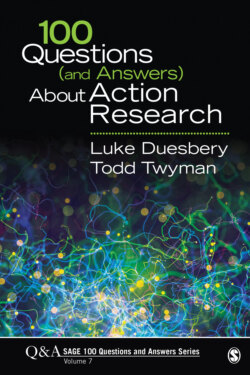Читать книгу 100 Questions (and Answers) About Action Research - Luke Duesbery - Страница 6
На сайте Литреса книга снята с продажи.
Preface
ОглавлениеThe genesis of this book stems from the authors’ personal experiences.
For Todd Twyman, it was with his oldest son, Ian. Todd tells the story of how Ian came home in tears at the end of the first week of school because he was in a reading group that was studying letters (alphabetic awareness). At this point, Ian was already able to read chapter books, and while Todd is not a reading expert, he is an expert in research and assessment. At his first parent–teacher conference, Todd asked Ian’s teacher why he was not assigned to a more appropriate group. The response was that “he scored below grade level on the test of oral reading fluency [ORF].” An ORF test asks a child to read for a minute, and then the number of correct words read is counted. And while the placement decision made sense from a data standpoint, it was obviously not the appropriate placement. When Todd asked about Ian’s scores on the other four measures of reading (alphabetic awareness, phonemic segmentation, vocabulary, and comprehension), the teacher reported that Ian scored at the top of his class in all of those measures. Ian was a good reader, but maybe not a fast one. Really, what parent teaches their child to read fast? Unfortunately, Ian would have to wait until the next cycle of testing before being reassigned. After Todd’s partner talked him off the metaphorical ledge, he approached Ian’s teacher as both a father and action researcher. Look at the data, try something different, are you sure? The teacher was actually relieved to have support. This is what action research is about—openly thinking and making decisions with one another.
For Luke Duesbery, it was with his daughter, Tiegue. In third grade, Tiegue was asked to complete a research project for the school science fair. You probably know of the standard elementary school science fairs. One hundred children packed into the gymnasium with poster boards and explaining what they had done over the semester. Given Luke’s background in research methodology, he volunteered to be a judge. His daughter’s project involved giving half of her class chocolate before reading a passage, to see if they read faster. Her hypothesis was that caffeine, via chocolate, could improve scores. Yes, the same test of ORF Todd described in the previous paragraph. It was a clever study. She knew chocolate could make your mind race, and she knew the test was about speed. Seeing her project and the simple and elegant projects the other elementary students generated caused Luke to question if there are real and smaller questions we can all answer like the third graders do?
Throughout our careers, we have been fortunate to work with many professionals—teachers, nurses, policymakers, CEOs, parents, and students from the kindergarten to graduate level. Our experiences are what drive this book. We believe there is a fundamental need for all of us to understand how action research can improve lives. And although much has been written about action research from different lenses—for example, systems and accountability, leadership, field practice—little has been written about action research as a form of advocacy and more specifically as a form of social justice. Thus, this book does not follow the path of textbooks that tacitly support the status quo. Rather, it is our intent that this book serve as a reference for readers to improve their practice as advocates for those they serve, their community, and—along the way—their children.
In this book, we choose not to clutter the text with citations. Instead we provide an appendix with what we think are books and articles worth pursuing, should you be interested.
—Live action research for life, not the day.
